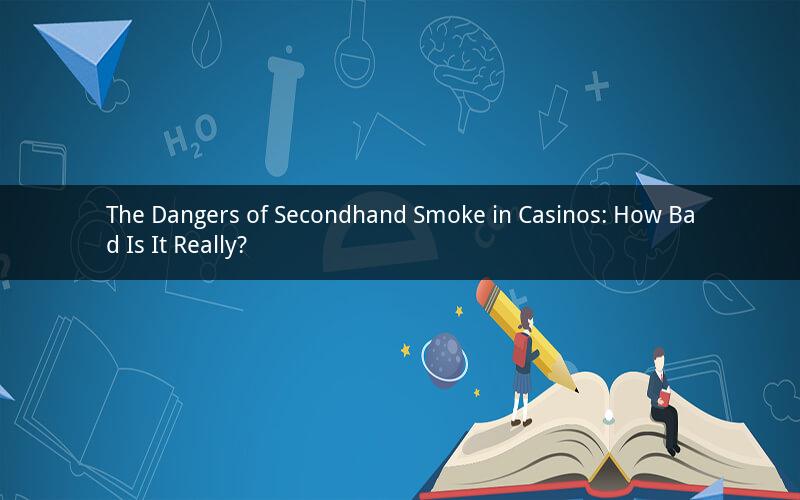
Introduction:
Casinos, known for their vibrant atmosphere and thrilling games, often attract a diverse crowd of visitors. However, one aspect that is often overlooked is the presence of secondhand smoke, which can have detrimental effects on both patrons and employees. In this article, we delve into the issue of secondhand smoke in casinos and explore how bad it really is.
1. The Health Risks of Secondhand Smoke
Secondhand smoke, also known as environmental tobacco smoke (ETS), refers to the smoke emitted from the burning end of a cigarette, pipe, or cigar, as well as the smoke exhaled by smokers. The American Lung Association states that secondhand smoke contains thousands of chemicals, including hundreds that are known to be toxic or carcinogenic.
1.1 Increased Risk of Respiratory Issues
Exposure to secondhand smoke in casinos can significantly increase the risk of respiratory issues such as asthma, chronic bronchitis, and chronic obstructive pulmonary disease (COPD). These conditions can lead to chronic coughing, wheezing, shortness of breath, and decreased lung function.
1.2 Higher Risk of Heart Disease and Stroke
Studies have shown that secondhand smoke can increase the risk of heart disease and stroke. The American Heart Association reports that non-smokers exposed to secondhand smoke are 25-30% more likely to develop heart disease and 20-30% more likely to have a stroke.
1.3 Increased Risk of Cancer
Secondhand smoke is a known carcinogen, and exposure to it can increase the risk of various types of cancer, including lung, throat, mouth, and bladder cancer. The American Cancer Society estimates that secondhand smoke causes approximately 7,300 lung cancer deaths among nonsmokers each year.
2. The Impact on Casino Employees
Casino employees, who are often exposed to secondhand smoke for extended periods, are at a higher risk of experiencing the health consequences mentioned above. According to the Centers for Disease Control and Prevention (CDC), approximately 50,000 nonsmokers die from heart disease and lung cancer each year due to exposure to secondhand smoke in the workplace.
3. The Legal and Ethical Implications
Several countries and states have implemented laws and regulations to protect individuals from secondhand smoke exposure. In some regions, casinos are required to have designated smoking areas or completely ban smoking indoors. However, enforcing these regulations can be challenging, as casinos are often crowded and difficult to monitor.
3.1 The Role of Casino Management
Casino management plays a crucial role in ensuring the safety and well-being of their patrons and employees. Implementing smoke-free policies, providing smoking cessation resources, and educating staff about the dangers of secondhand smoke can help reduce the risk of exposure.
3.2 The Ethical Dilemma
On a broader scale, the presence of secondhand smoke in casinos raises ethical concerns. Casinos have a responsibility to prioritize the health and safety of their customers and employees. Denying this responsibility can lead to negative consequences, both for individuals and the reputation of the casino.
4. Alternatives to Secondhand Smoke
To address the issue of secondhand smoke in casinos, several alternatives have been proposed:
4.1 Smoking Areas
Designating specific smoking areas within casinos can help minimize the exposure to secondhand smoke for non-smokers. However, it is crucial to ensure that these areas are well-ventilated and properly maintained.
4.2 Smoking Cessation Programs
Offering smoking cessation programs to both patrons and employees can help reduce the prevalence of smoking within casinos. These programs can include counseling, nicotine replacement therapy, and support groups.
4.3 Electronic Cigarettes (E-cigarettes)
E-cigarettes have been suggested as a potential alternative to traditional cigarettes. However, research on their safety and effectiveness is still ongoing, and their use in casinos is a topic of debate.
5. Conclusion
The presence of secondhand smoke in casinos poses significant health risks to both patrons and employees. While there are legal and ethical implications associated with this issue, casinos can take proactive measures to minimize exposure and protect the well-being of their guests. By implementing smoke-free policies, providing smoking cessation resources, and ensuring compliance with regulations, casinos can create a safer and healthier environment for everyone involved.
Additional Questions and Answers:
1. Q: Can secondhand smoke in casinos affect children?
A: Yes, secondhand smoke can have detrimental effects on children, including respiratory issues, increased risk of asthma, and developmental problems.
2. Q: Are there any long-term health consequences of secondhand smoke exposure in casinos?
A: Yes, long-term exposure to secondhand smoke can lead to chronic respiratory diseases, heart disease, stroke, and various types of cancer.
3. Q: Can casinos be held liable for health issues caused by secondhand smoke exposure?
A: In some cases, yes. If a casino fails to take adequate measures to protect its patrons and employees from secondhand smoke exposure, it may be held liable for any resulting health issues.
4. Q: Are there any benefits to smoking indoors in casinos?
A: No, there are no health benefits to smoking indoors. In fact, the risks associated with secondhand smoke exposure are even greater in enclosed spaces like casinos.
5. Q: Can casinos implement effective smoke-free policies while still maintaining their business operations?
A: Yes, casinos can implement effective smoke-free policies by providing designated smoking areas, enforcing the rules, and offering smoking cessation resources. This can help maintain a healthy environment without significantly impacting their business operations.